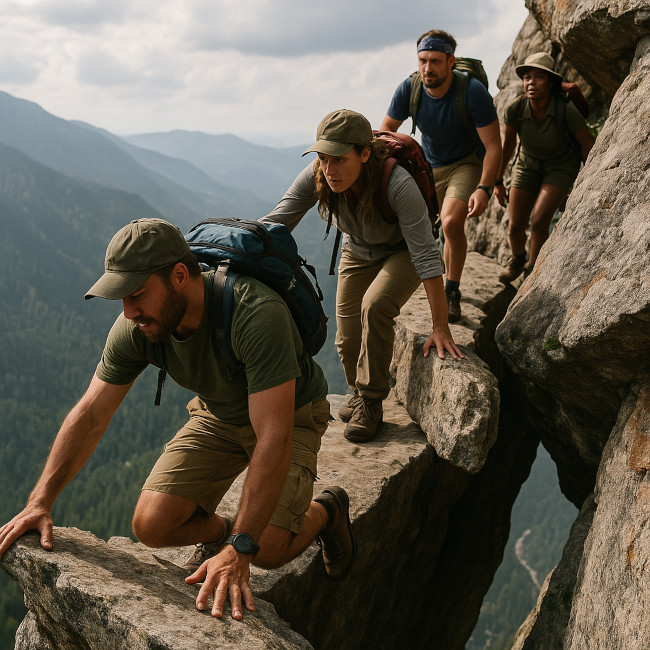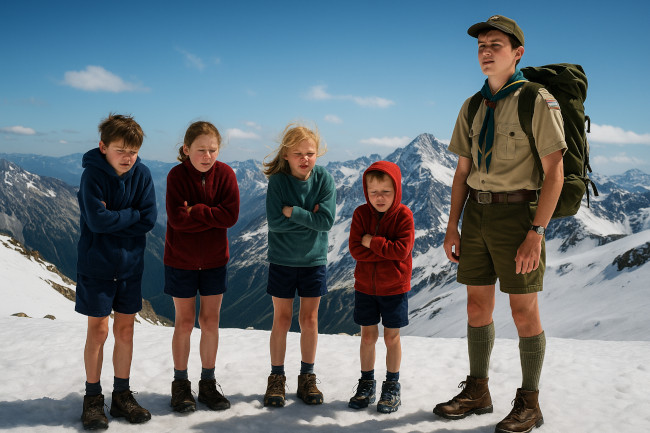
A group of hikers on an extremely risky route. Even a benevolent guide could be held responsible if the hikes they lead are very risky and proper care for safety is not taken.

What is the legal responsibility of a non-profit hiking guide?
On this page, we refer to this figure as a benevolent guide, understood as a general concept applicable worldwide. Each country has its own laws, and in some, many people avoid organizing group activities due to fear of potential legal consequences.
However, most legal systems agree that when a hike is led by a person who does not charge for it, the legal risk tends to be much lower.
At the end of the article, we include more specific details on how this concept is treated in the case of Spain.
What is the legal figure of a "benevolent guide"?
The legal figure of a "benevolent guide" refers to a person who voluntarily accompanies or leads others in an activity, without receiving payment or formal compensation, generally in recreational, outdoor, or group settings.
Key Characteristics:
- Unpaid: The guide does not receive money or material compensation.
- Voluntary: The role is assumed out of goodwill, friendship, or shared interest.
- Non-professional: The person is not acting as a certified or hired professional guide.
- No formal contract: There’s usually no legal or commercial agreement involved.
Legal Implications:
In many legal systems, a "benevolent guide" may be exempt from certain liabilities (such as civil liability in case of accidents), as long as:
- There is no gross negligence or intentional harm.
- The guide acts within reasonable limits of their knowledge and capability.
Example:
If someone takes friends on a hike, purely as a favor and not as a paid service, and one of the friends gets injured, the guide may not be legally responsible, because they were acting as a benevolent guide. However, this could change if the guide acted recklessly or misled the group about the risks.
Commentary on the figure of the "benevolent guide" in Spain
In the Spanish legal context, the figure of the benevolent guide is not specifically regulated by a particular law but can be understood within the general framework of non-contractual civil liability established in Article 1902 of the Civil Code, which states that "he who by action or omission causes damage to another, involving fault or negligence, is obliged to repair the damage caused."
However, when a person acts as a guide in an altruistic and non-professional manner — that is, without receiving economic compensation or holding an official technical qualification — they can be considered a benevolent guide. In these cases, courts tend to assess whether there was fault or gross negligence to determine possible liability.

Anyone who takes children on a walk should know what they are doing.
Practical Implications:
- If the benevolent guide acted with reasonable diligence and within their capabilities, they are usually not held liable.
- The existence of a relationship of trust or friendship can influence the interpretation of liability.
- However, if gross negligence or recklessness is demonstrated, civil liability could be demanded.
Conclusion:
In Spain, the benevolent guide may benefit from certain legal flexibility, provided they act prudently and do not cause harm through negligence. Nonetheless, in case of doubt or in the context of risky activities, it is recommended to have civil liability insurance or to clearly define the roles and expectations among participants.
Legal Cases in Spain Related to Accidents During Mountain Activities
1. Death from Hypothermia in the Sierra de Gredos (2013)
In March 2013, during a hike organized by the Bilbao Alpine Club in the Sierra de Gredos, a female hiker died from hypothermia after becoming separated from the group under adverse weather conditions. The Civil Guard charged the organizer with "failure to render aid and negligent homicide." However, in June 2014, the court dismissed the case, considering that the organizer was acting as just another participant, with no contract or remuneration, and that decisions were made collectively by the group members.
Legal Case in Spain Related to a Mountain Activity Accident
Liability of a Benevolent Guide During a Mountain Hike
In a case analyzed by Spanish jurisprudence, the liability of a benevolent guide during a mountain hike where an accident occurred was discussed. The guide, who was neither a professional nor paid, led an activity in which a participant was injured. The court considered that although the guide acted altruistically, he assumed a position of leadership and therefore held certain responsibilities. However, it was determined that there was no criminal liability, as no gross negligence or breach of specific duties by the guide was proven.
